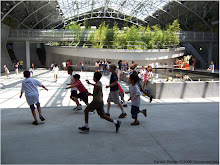Janet Petitpas, Senior Associate, London
The new identity exhibit at the Science Museum in London, Who am I?, includes a gallery called Live Science in which real scientists come into the Museum to carry out their research using Museum visitors as volunteers.

The current partnership is called “me in 3D” and involves having one’s face photographed by a three-dimensional camera. The study is in partnership with the National Health Service, the Great Ormond Street Hospital for Children, and the Institute for Child Health in which they are hoping to record the differences in facial shape in order to help improve facial reconstruction surgery. While much is known about the bones of the face, little is known about what makes a face the shape it is and about the skin and muscles that make up our faces. By having more information about our faces, researchers will have greater opportunities to plan and perform the best facial surgery they can in the future.

I went and had my face scanned this week and it was a quick and easy process given that the area was not very crowded. Visitors must sign a release form, which is the most time-consuming part of the process, and then remove any earrings or other metal from their head, put on a paper cap and get ready for your close-up! Apparently nine lenses are used, but all of this is accomplished through what seems like one photo as all photos are taken simultaneously.
Once your photo is taken you get a slip with a copy of your release and a sticker with your number on it. There are computers located in the area in which you can access and manipulate your image - I assumed I could go home and access my image from home, but that doesn't seem to be the case. It would certainly be an improvement if you could also access your image at home with your personal access number, but it was satisfying to feel like part of a bigger project that might benefit children and adults in the future.
How are you using live science or resources in your community to link science to your visitors?






No comments:
Post a Comment